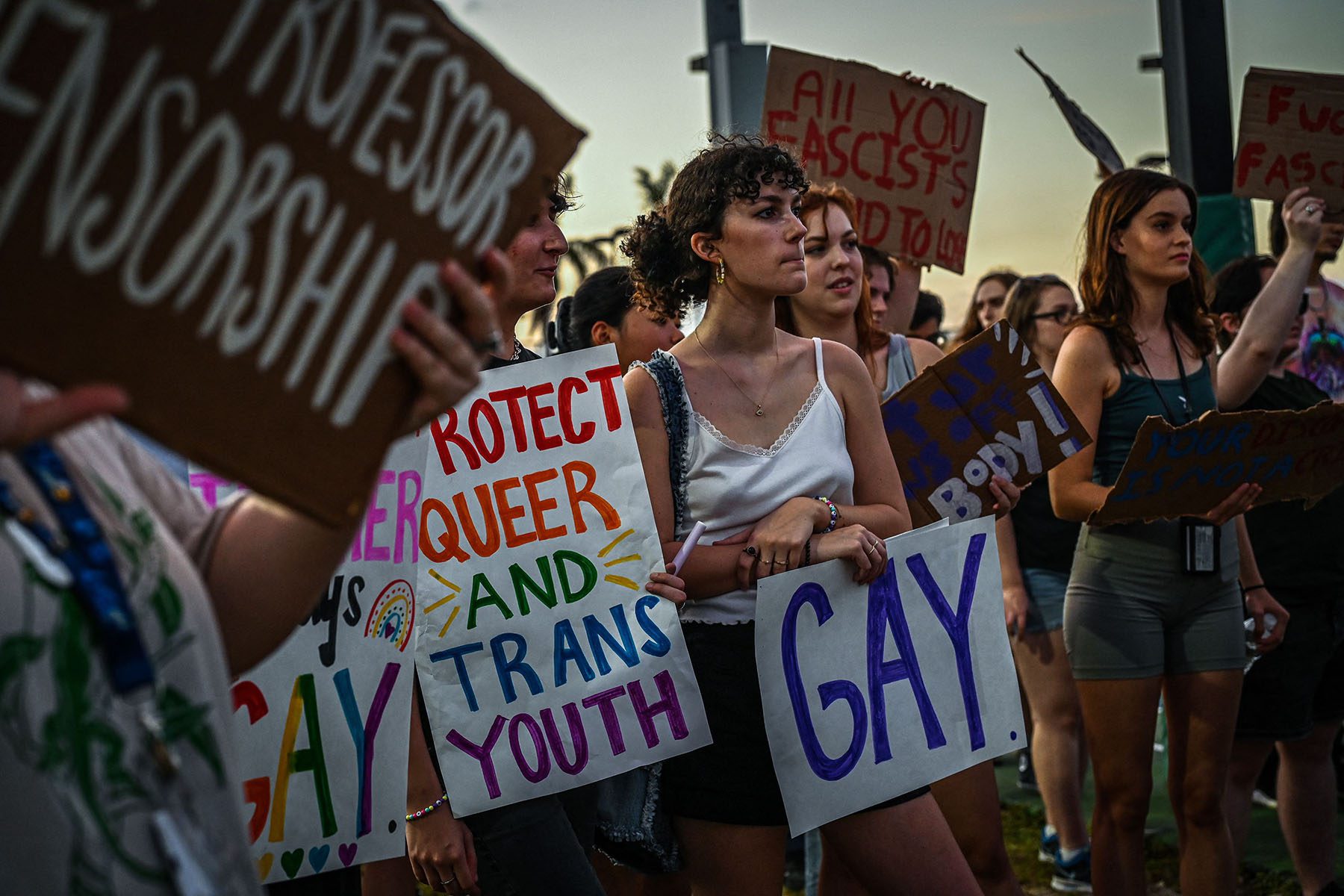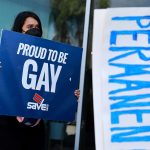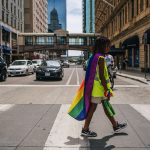We’re answering the “how” and “why” of politics and LGBTQ+ news. Subscribe to our daily newsletter.
Madeline Scotti couldn’t wait to be a part of their school’s production of “Indecent.” A senior at Douglas Anderson School of the Arts in Jacksonville, Florida, Scotti had been cast in one of the lead roles and was also serving as the dramaturg — the expert on a play’s text who serves as a resource for the actors, director and crew. Scotti had worked hard over winter break preparing for the start of rehearsals, eager to share the work with their school community.
“Indecent” felt especially timely — it tells the story of a 1923 production of the Yiddish play “God of Vengeance” that led to the eventual arrest and conviction of that show’s producer and cast for its depiction of a lesbian relationship. With a rise in antisemitic activity nationwide and Florida’s passage of the Parental Rights in Education — known colloquially as “Don’t Say Gay” — Scotti felt passionate about sharing the story about Jewish life in the face of homophobia with their community.
Scotti said they entered the show’s first rehearsal after returning from the winter break “grinning ear to ear,” but they instantly noticed that “the adults in the room seemed less energetic than we were.” The show’s producer then announced that the show had been canceled, a decision made by school administrators who said the show contained “inappropriate content” — the script includes a sex scene between two women.
Scotti said she initially assumed that their producer was joking: Canceling the production of a play that grapples with the effects of censorship on artists sounded like a punchline.
“We all kind of looked around the room waiting for someone to laugh,” they said. “We thought he was going to laugh and be like, ‘OK, now take this feeling and use it in a scene!’”
Instead, the students at the public arts high school would perform Anton Chekov’s play “The Seagull,” which principal Tina Wilson wrote in an email to families was “more suitable for student performers and student audiences.”
“Although students were required to provide parental consent to appear in the original selection, a closer review of the mature content of ‘Indecent’ led us to the conclusion that ‘Seagull’ is better suited for a school production,” Wilson wrote in the email.
A statement from Duval County Public Schools said, “‘Indecent’ contains adult sexual dialog that is inappropriate for student cast members and student audiences. It’s that simple.” It added that canceling the production was “a function of our responsibilities to ensure students engage in educational activities appropriate for their age.”
Scotti took to social media, and their video describing the show’s cancellation quickly went viral, landing the school and its students in the middle of the nationwide focus on Florida and raising questions about the impact of “Don’t Say Gay” beyond its written scope.
“The assumption that has been made is that this has to do with the “Don’t Say Gay” bill,” Scotti told The 19th. “As I said in my [TikTok] video, this is not because of the “Don’t Say Gay” bill, but related, I think, to the idea of the Parental Rights Act being initiated.”
Clay Calvert, a professor emeritus at the University of Florida’s Levin College of Law and an expert on 1st Amendment rights, told The 19th that the school was likely within its rights to censor the performance. The 1988 Supreme Court decision in Hazelwood School District v. Kuhlmeir ruled that schools can censor school-sponsored speech or speech that is a part of the curriculum as long as the reasons for doing so are “reasonably related to legitimate pedagogical concerns.”
Calvert notes that the ruling sets a standard that is intentionally very deferential to schools. What this did, Calvert explained, is create a standard that said upfront that if a school finds content “unsuitable for immature audiences, that would be a legitimate reason for censoring it.”
Calvert described the effect of “Don’t Say Gay” on Florida classrooms as indirect, and related to the overall environment that brought on the legislation rather than anything written in the law, which, as written, is rather narrow in its scope; the law technically only to classroom instruction in kindergarten through 3rd grades. Despite this, Calvert said that “probably, educators in Florida at all levels do fear reprisal for speech that might touch on certain LGBTQ issues today.”
“There’s no small amount of irony that a play that stems from an incident a century ago is still being censored today in a public school context,” Calvert said. “Public school administrators and teachers at all levels are no doubt aware of the rather conservative environment that we have in Florida. It really gets at the more macro level question of who gets to control what really takes place in public schools.”
For students like Scotti, that question feels disheartening at best and scary at worst.
“There’s a line in the show that says, ‘It won’t reach us here. It can’t happen here.’ They’re referring to the Holocaust from the perspective of being in America. That’s almost how we felt that day when we heard this news,” Scotti said. “We never thought it would ever reach us because we thrive in such a beautiful community filled with queer people and trans people [at Douglas Anderson]. So to have that reality shock was heartbreaking.”
Brandon Wolf, the press secretary of Equality Florida — a political advocacy group that advocates for civil rights and protections for LGBTQ+ people in Florida — told The 19th he saw a clear connection between the play’s cancellation and the Florida education law.
“We warned from the beginning that school districts, when faced with the prospects of an angry parent and a lawsuit they can’t afford to fight, would be forced between a rock and a hard place and take the path of trying to interpret the law in a way that protects them from legal liability,” he said.
He said Don’t Say Gay has had ripple effects throughout Florida: a wave of bans on books with LGBTQ+ characters, the peeling off of rainbow and “safe space” stickers from classroom windows, teachers taking off lanyards that say “ally.”
Scotti wishes they were able to stage “Indecent” so more people could see in it what has resonated so deeply about the work with her — so much so, that they wrote their college essays about it. “There is so much purity in this show, so much purity to combat the awful rhetoric towards us that says we are dirty or that we are perverting the minds of children — which is crazy, because we are children.”
Scotti described Douglas Anderson as “a community” and as “a bubble” that had previously felt immune to the larger political forces sweeping the state of Florida right now. It’s why she has felt so compelled to speak out publicly and rally attention for the situation at their school right now, and they hope that what’s happening at Douglas Anderson will inspire more young people to talk about how recent legislation has touched them.
“I am so tired of seeing the people I love hate themselves because of the environment that envelops us,” they said. “I was just tired of seeing so many good people get hurt because of the hatefulness that is in the air. It’s hard to fight against these people who have the power. I’m still in school. I can’t do much as a young person. I can only speak, and so that’s what I’ve been trying to do — to speak, and to organize and to rally people together, and then let the adults handle all of the legal stuff.”







